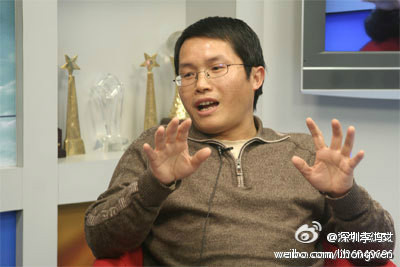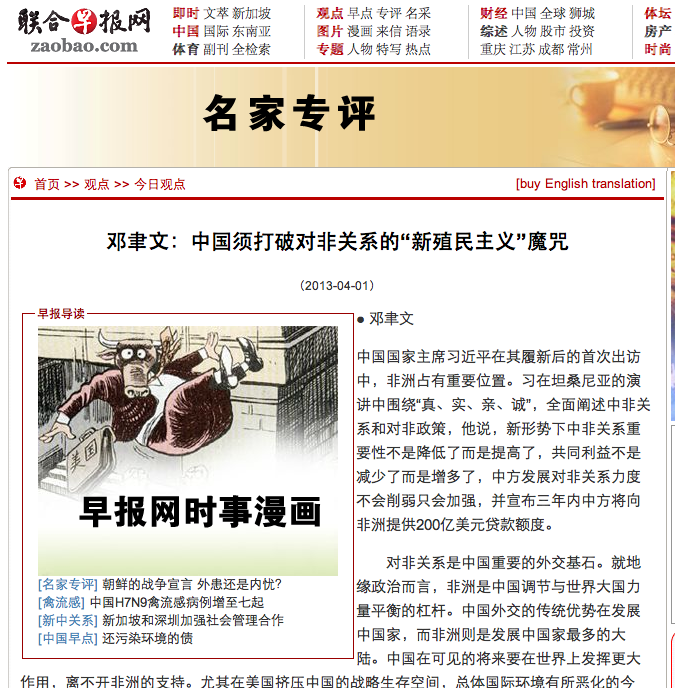Deng Yuwen, the deputy editor of the Central Party School’s Study Times journal and an influential commentary writer, was suspended from his post earlier this week. The cause of the Deng’s suspension is reportedly an article published on February 27 in the Financial Times, in which Deng argued that China’s relationship with North Korea had become a liability.
This isn’t the first time that an editorial written by a prominent Chinese journalist for the Financial Times has kicked up a domestic storm.
Chang Ping, a former CMP fellow and a prominent editor at the Southern Daily Group, came under fire in 2008 after he published an editorial on FT Chinese about unrest in Tibet. That editorial, “Where does the truth about Lhasa come from?“, was the beginning of the end for Chang Ping’s long career with Southern Weekly. He was finally forced out in January 2011.

[ABOVE: An image of Deng Yuwen that has been shared widely on Sina Weibo since the news on April 1 of Deng’s suspension.]
But one of the most interesting differences between Chang Ping’s case and that of Deng Yuwen is how much the latter has been talked about inside China. And one important reason for this is the rise of the microblog.
Back in 2008, when Chang Ping’s editorial caused a stink, Sina Weibo’s launch was more than a year off. Sure, there were online forums like Tianya that enabled discussion of many issues, but these forums were actively and quite effectively guided by online censors — that was the year that saw the rise of the so-called “50-cent Party” — who kept the Tibet issue squarely on sideshows like the so-called “Jack Cafferty Affair.”
It’s difficult to quantify the discussion over Deng Yuwen’s suspension and China’s policy toward North Korea, but there definitely is plenty of discussion out there. Once again, this raises the broader issue of how media control itself is being subjected to a greater degree of exposure than we’ve seen in the past, thanks in large part to the development of social media and other internet tools.
The following is just a taste of the discussion on Sina Weibo about Deng Yuwen’s suspension.
Li Hongwen (李鸿文), a Shenzhen-based Weibo user with just under 20,000 followers, wrote:
Study Times deputy editor Deng Yuwen has been suspended — http://t.cn/zT2WQA3 — Deng Yuwen is an intra-system writer who dared to use an intra-system (体制内) platform to speak a bit of truth. And this little bit of truth was not only critical but also constructive. It was entirely “politically correct.” The tyrants of the Golden Shit Dynasty (金屎王朝) [of North Korea] have angered the gods, and there’s nothing at all wrong with saying that in our foreign policy we should extricate ourselves from this piece of shit — for the sake also of the Chinese Dream (中国梦).
“The system can’t even stomach its own people,” said one comment under Li Hongwen’s post.
“Things will only get tighter and tighter, because they worry day and night about losing their grip on power,” said another.
Wu Liucun, an overseas Chinese Weibo user with more than 12,000 followers, wrote:
Actually, Deng Yuwen’s point of view is already being discussed actively among citizens, who naturally care about China’s national interests. When the news came out online that Deng has been suspended, this generated a lot of discussion online. Some objected to the suspension while other felt it was too lenient, that he should lose his official status (开除公职). Some thought he must be a dog serving the Americans, and that he should be struck.
Another user, with just a few hundred followers, wrote that the complete absence of substantive discussion of the North Korean issue was “lamentable,” suggesting this is a discussion many Chinese do want to have:
Damnit, if it weren’t for the fact that this is a foreign policy failure, would they have been afraid of criticism in the first place? . . . This is normal, of course. Of course Party-run publications aren’t going to permit viewpoints that go against the official view . . . What’s lamentable, though, is the fact that no other substantive viewpoints [on this issue] exist outside the Party papers.
Wu Yichun (吴义春), a lawyer in Guangdong province, announced through Sina Weibo that he had just made a new post to his blog on China.com. The post, “Deng Yuwen Suspended After Calling on China to Give Up North Korea,” is in fact a re-run of the BBC Chinese version of the Deng story. But the lawyer’s blog post is a good illustration of how many Chinese are not only aware of the Deng Yuwen story, they are aware (thanks in part to Weibo) of how the story is being reported outside China:
A report from the New York Times says that due to Deng Yuwen’s status as deputy editor of the Study Times, his article drew widespread attention in Washington and in Europe, and some people read this as a sign that China’s new leadership was fed up with North Korea, and that they were planning to adjust the relationship with Pyongyang.
However, as of now there are no signs whatsoever that China’s policy makers are interested in responding to Deng Yuwen’s suggestions.
Users also shared other writings from Deng Yuwen, including this piece that ran in Singapore’s Lianhe Zaobao on April 1, in which Deng discusses President Xi Jinping’s diplomatic tour of Africa.

[ABOVE: Users on Sina Weibo share other writings of suspended Study Times deputy editor Deng Yuwen, including this April 1 article in Singapore’s Lianhe Zaobao.]




















